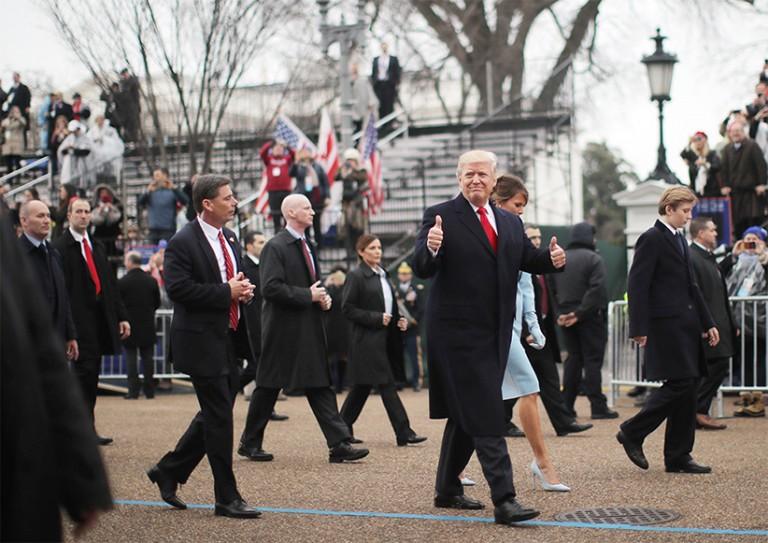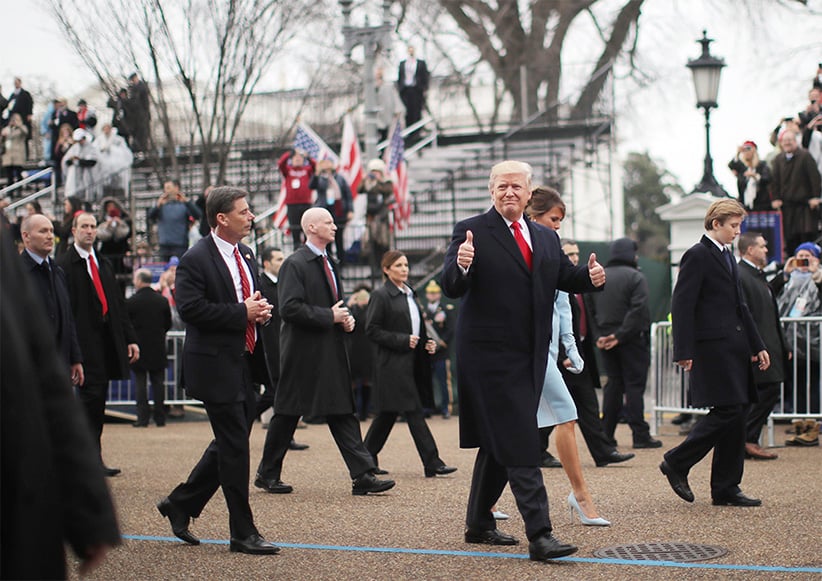Donald Trump invites authoritarianism to America
America’s scary flirtation with authoritarianism threatens its democratic foundations—and it’ll take a concerted global effort to push back

U.S. President Donald Trump gestures while walking with wife Melania and son Barron during the Inaugural Parade in Washington, January 20, 2017. Donald Trump was sworn in earlier as the 45th President of the United States. (Carlos Barria/Reuters)
Share
If you’re not worried right now, you’re not paying attention. Or perhaps you’re a partisan whose capacity to warp reality to fit your world view is on par with the ability of large bodies to significantly alter space-time. Donald Trump’s election as president of the United States was abnormal, and the very early days of his administration have given us more reason to be concerned about the future of America and the global order than we had even in the tumultuous months following his victory.
Politicians, academics, commentators, and journalists have regularly compared Trump’s rise to that of fascist and authoritarian leaders. In the halcyon days of only a year ago, it was impolite at best—and absurd at worst—to mention either fascism or authoritarianism in a conversation about mainstream American politics. Indeed, back then, Godwin’s Law marked the outer limits of civil discussion: the claim that the longer a discussion (on the Internet) continues, the more likely it is that Hitler will be invoked as a comparison meant to criticize another’s extremism. Now, epithets such as “Hitler” or “Nazi” or “authoritarian” are just plausible enough that they betray a reasonable, growing anxiety.
At best, Trump exercises authoritarian tendencies. (At worst, he and his supporters’ words and actions come disconcertingly close to authoritarianism’s most virulent and nationalist variety, fascism.) Authoritarianism, to slightly adapt political scientist Juan Linz’s definition, is a way of governing marked by severe limits to freedom—the centralization of authority in the hands of a single leader or small group of leaders who may use power to benefit personally (for instance, by using the state to generate personal wealth), and impose limits on civil society. As a way of directing the affairs of state, authoritarianism is enabled and sustained by force—or the threat of force—and is further underwritten by supporters who demonstrate a deep, often emotional attachment to the leader and the regime.
Perhaps all of that is starting to sound familiar.
The Oval Office’s newest tenant owns a politics marked by compulsive, blatant, and sustained lying aimed at generating a cult of personality, rallying his supporters, undermining his opponents, and putting the press on their back heels. On Saturday, Trump’s press secretary, Sean Spicer, stood in the White House briefing room and lied to the assembled media about the crowd size at Trump’s inauguration. “This was the largest audience to ever witness an inauguration, period,” he said.
It wasn’t. But his boss lives in a perpetual campaign and his cult of personality demands ongoing veneration. So, this time, a small, blatant lie was told.
Since then, Trump has declared his inauguration a “National Day of Patriotic Devotion,” ordered the construction of a border wall with Mexico, advocated torture, silenced government agencies, launched an investigation into (non-existent) voter fraud, and doubled-down on his promise to ramp up deportations while also limiting entrance to the United States by refugees and Muslims. At the same time, his advisers have been disputing reality, with one, Kellyanne Conway, claiming the existence of “alternative facts.”
In a November essay, political theorist Jacob Levy highlighted that the power to speak untruths and to make others repeat them is a time-worn tactic of oppression: “Saying something obviously untrue, and making your subordinates repeat it with a straight face in their own voice, is a particularly startling display of power over them…Arendt analyzed the huge lies and blatant reversals of language associated with the Holocaust. Havel documented the pervasive little lies, lies that everyone knew to be lies, of late Communism. And Orwell gave us the vivid ‘2+2=5.’ ”
Coupled with attempts to bend reality to his will, Trump sorts the world into simple groups, characterizes them as enemies of one another, and then takes sides. His nativism, nationalism, and isolationism reflect his one-dimensional thinking. In his inaugural address, he began by claiming “Today’s ceremony…has very special meaning because today, we are not merely transferring power from one administration to another or from one party to another, but we are transferring power from Washington, D.C. and giving it back to you, the people.”

While he speaks to a long-standing concern—that American politicians don’t serve the interests of the people they’re elected to represent—his division of the world into “elites” and “the people” is deliberately antagonistic. Moreover, his solution to the problems facing the United States is to use the power of the presidency to do battle rather than to work to find solutions. His default operating mode is belligerence—and belligerence requires enemies. This characterization of politics is the antithesis of pluralist liberal democracy.
When Trump says “This American carnage stops right here and stops right now,” he is referencing not crime, but an idea of the United States as a nearly post-apocalyptic hellscape marked by unchecked violence and widespread decay, porous borders across which would-be terrorists are constantly moving, and foreign enemies whose only interest is in the decline and fall of the Republic. He divides the world into heroes (the People) and villains (foreigners, criminals, terrorists, elites). To do battle, extraordinary commitment is required. So are extraordinary powers.
What do Americans get in return?
As Trump said in his inaugural, which reads like it might have been written for a Jerry Bruckheimer movie, “There should be no fear. We are protected and we will always be protected. We will be protected by the great men and women of our military and law enforcement. And most importantly, we will be protected by God.”
Americans get to be safe. Secure. Protected. Just trust and follow the leader.
RELATED: Donald Trump and the new world order
In advanced democracies, a first line of defence against encroaching authoritarianism is elections. If you don’t elect would-be authoritarians, their path to power is much more difficult. Downstream, there are other formal and informal institutions meant to prevent the rise of such people: The Constitution, the courts, law-making bodies, sub-state units, the press, and civil society.
It’s unclear if American institutions will now be able to effectively check Trump. The American system of checks and balances was designed to enable branches of government to resist overreach by their counterparts. To the extent that there was to be an institutionalized adversarial relationship, political parties weren’t the primary mode of organization—branches of government were.
Today, deep polarization between Republicans and Democrats, Republican domination of Congress and state legislatures, and a Supreme Court that will soon feature a majority of Republican-appointed justices could enable Trump to stretch his authority further than other presidents have before as the Red Team squares off against the Blue Team.
None of us knows what comes next. The United States is in uncharted territory and consequently so is the rest of the world. What is to become of the American experiment and the global order? Will America slowly drown in the rising tide of authoritarianism? The fact that it now seems at least plausible that it might, the rapid and bold and frightening steps that Trump has taken in his first days as president, and the uncertainty about the future on so many fronts means that resistance to extremism—and active support for rights and democracy—are more important now than they have been at any time since the Second World War.
A more stable future now hinges on the institutions we have collectively built over the course of decades and, in some cases, centuries. Democracy and rights can only exist through the continued support of a critical mass of those committed to them. Sustained civic action combined with rigorous, critical press coverage will be necessary but not sufficient elements for a bold response. Preserving the best of both America and the world as we know them will also require millions of people believing that democracy and human rights are not just the ways of the past and the present—but also the path toward a more just future. For Americans, that might require reflection on the revolutionary origins of their country and a reminder that liberty can never be taken for granted.
RELATED:
David Moscrop is a Ph.D. candidate at the University of British Columbia and a writer. He’s currently working on a book about why we make bad political decisions and how we can make better ones. He’s at @david_moscrop on Twitter.